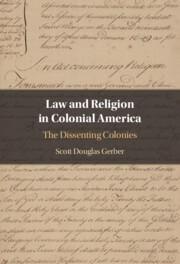Book contents
- Law and Religion in Colonial America
- Also by Scott Douglas Gerber
- Law and Religion in Colonial America
- Copyright page
- Dedication
- Epigraph
- Contents
- Tables
- Acknowledgments
- A Note on Methodology
- Introduction English Law about Religious Toleration Prior to the Planting of Colonial America
- 1 Law and Catholicism in Colonial Maryland
- 2 Law and the Lively Experiment in Colonial Rhode Island
- 3 Law and the Holy Experiment in Colonial Pennsylvania
- 4 Law and Congregationalism in Colonial Connecticut
- 5 Law and a City Upon a Hill in Colonial Massachusetts
- Conclusion Law, Religion, and Historiography in Colonial America
- Works Cited
- Table of Laws
- Index
3 - Law and the Holy Experiment in Colonial Pennsylvania
Published online by Cambridge University Press: 19 October 2023
- Law and Religion in Colonial America
- Also by Scott Douglas Gerber
- Law and Religion in Colonial America
- Copyright page
- Dedication
- Epigraph
- Contents
- Tables
- Acknowledgments
- A Note on Methodology
- Introduction English Law about Religious Toleration Prior to the Planting of Colonial America
- 1 Law and Catholicism in Colonial Maryland
- 2 Law and the Lively Experiment in Colonial Rhode Island
- 3 Law and the Holy Experiment in Colonial Pennsylvania
- 4 Law and Congregationalism in Colonial Connecticut
- 5 Law and a City Upon a Hill in Colonial Massachusetts
- Conclusion Law, Religion, and Historiography in Colonial America
- Works Cited
- Table of Laws
- Index
Summary
Religious liberty is a core component of America’s legal culture. William Penn, the Quaker founder and proprietor of colonial Pennsylvania, played an indispensable role in ensuring that it is. Indeed, Thomas Jefferson—the author of one of the most celebrated religious liberty laws in American history, the Virginia Statute for Religious Freedom of 1786—described Penn as “the greatest lawgiver the world has produced, the first in either antient or modern times who has laid the foundation of govmt in the pure and unadulterated principles of peace of reason and right.” Jefferson was correct. After all, the commitment to liberty of conscience that characterized colonial Pennsylvania traced directly to Penn’s vision, example, and determination: Pennsylvania enacted more laws about religious tolerance than any other British American colony, both before and after Penn’s death. Delaware, which Penn also owned and which constituted the “lower counties” of Pennsylvania until it became an independent state in 1776, likewise enacted religiously tolerant laws even when Penn permitted it to govern itself with a separate assembly after 1704.
- Type
- Chapter
- Information
- Law and Religion in Colonial AmericaThe Dissenting Colonies, pp. 67 - 133Publisher: Cambridge University PressPrint publication year: 2023

